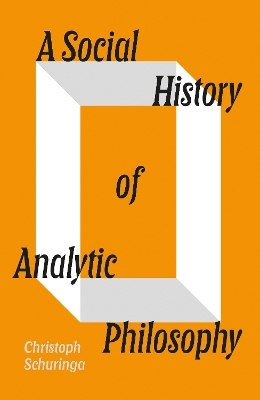
A Social History of Analytic Philosophy
How Politics Has Shaped an Apolitical Philosophy
Seiten
2025
Verso Books (Verlag)
978-1-80429-209-9 (ISBN)
Verso Books (Verlag)
978-1-80429-209-9 (ISBN)
- Noch nicht erschienen (ca. Mai 2025)
- Versandkostenfrei innerhalb Deutschlands
- Auch auf Rechnung
- Verfügbarkeit in der Filiale vor Ort prüfen
- Artikel merken
How a supposedly apolitical form of philosophy owes its continuing power to social and political forces.
Analytic philosophy is the dominant form of philosophy in the English-speaking world, and beyond, today. What explains its continuing success? Christoph Schuringa argues that its enduring power can only be understood by examining its social history. Analytic philosophy tends to think of itself as concerned with eternal questions, raised above the changing scenes of history. It thinks of itself as apolitical, and unaffected by political and social forces. This book, however, powerfully shows that the opposite is true.
The origins of analytic philosophy are in a set of distinct movements, chief among them the Cambridge philosophy of Bertrand Russell and G.E. Moore, and logical positivism of the Vienna Circle, shaped by highly specific, and different, sets of political and social forces. Only after World War II were these disparate, often dynamic movements joined together to make 'analytic philosophy' as we know it. In the climate of McCarthyism, what now established a hegemonic hold on the world of philosophy, under the aegis of European émigrés such as Rudolf Carnap and American philosophers such as W.V. Quine, was robbed of political force.
To this day, analytic philosophy is the ideology of the status quo. It may seem arcane and largely removed from the real world, but analytic philosophy is a crucial component in upholding liberalism, through its central role in elite educational institutions and its reinforcement of other parts of the intellectual culture such as neoclassical economics. As Schuringa concludes by arguing, the apparent increasing friendliness of analytic philosophers to rival approaches in philosophy should be understood as a form of colonization; thanks to its hegemonic status, it reformats all it touches in the service of its own imperatives, going so far as even to colonize decolonial efforts in the discipline.
Analytic philosophy is the dominant form of philosophy in the English-speaking world, and beyond, today. What explains its continuing success? Christoph Schuringa argues that its enduring power can only be understood by examining its social history. Analytic philosophy tends to think of itself as concerned with eternal questions, raised above the changing scenes of history. It thinks of itself as apolitical, and unaffected by political and social forces. This book, however, powerfully shows that the opposite is true.
The origins of analytic philosophy are in a set of distinct movements, chief among them the Cambridge philosophy of Bertrand Russell and G.E. Moore, and logical positivism of the Vienna Circle, shaped by highly specific, and different, sets of political and social forces. Only after World War II were these disparate, often dynamic movements joined together to make 'analytic philosophy' as we know it. In the climate of McCarthyism, what now established a hegemonic hold on the world of philosophy, under the aegis of European émigrés such as Rudolf Carnap and American philosophers such as W.V. Quine, was robbed of political force.
To this day, analytic philosophy is the ideology of the status quo. It may seem arcane and largely removed from the real world, but analytic philosophy is a crucial component in upholding liberalism, through its central role in elite educational institutions and its reinforcement of other parts of the intellectual culture such as neoclassical economics. As Schuringa concludes by arguing, the apparent increasing friendliness of analytic philosophers to rival approaches in philosophy should be understood as a form of colonization; thanks to its hegemonic status, it reformats all it touches in the service of its own imperatives, going so far as even to colonize decolonial efforts in the discipline.
Christoph Schuringa studied philosophy at King's College, Cambridge and Birkbeck College, University of London. He has published widely on the history of philosophy and on Marx and Marxism, and is associate professor of philosophy at Northeastern University, London. He is Editor of the Hegel Bulletin, and his writing has appeared in Jacobin, New Left Review, European Journal of Philosophy and elsewhere.
| Erscheint lt. Verlag | 13.5.2025 |
|---|---|
| Verlagsort | London |
| Sprache | englisch |
| Maße | 153 x 234 mm |
| Gewicht | 450 g |
| Themenwelt | Geisteswissenschaften ► Philosophie ► Geschichte der Philosophie |
| Geisteswissenschaften ► Philosophie ► Philosophie der Neuzeit | |
| ISBN-10 | 1-80429-209-5 / 1804292095 |
| ISBN-13 | 978-1-80429-209-9 / 9781804292099 |
| Zustand | Neuware |
| Haben Sie eine Frage zum Produkt? |
Mehr entdecken
aus dem Bereich
aus dem Bereich
die kolonialen Wurzeln der französischen Theorie
Buch | Hardcover (2024)
Matthes & Seitz Berlin (Verlag)
28,00 €
eine Geschichte der Zuversicht von Homer bis zum Klimawandel
Buch | Hardcover (2024)
C.H.Beck (Verlag)
28,00 €


